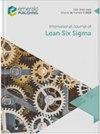Prioritizing the mitigation strategies to lean and green barriers using fuzzy BWM-FTOPSIS method in the food supply chain: an empirical case study
IF 3.7
2区 工程技术
Q2 ENGINEERING, INDUSTRIAL
引用次数: 3
Abstract
Purpose This paper aims to assist managers and food supply chain practitioners in efficiently implementing lean and green (LG) practices for sustainability. Examining barriers to LG practices, as well as prioritizing mitigation strategies in the food supply chain, are all part of this work. Design/methodology/approach Using a combination of literature review and expert team inputs, this paper investigated the LG barriers and their solutions under PESTEL (Political, Economic, Social, Technological, Environmental and Legal) framework. To prioritize them, this work used the fuzzy best worst method (fuzzy BWM) with the fuzzy technique for order preference by similarity to ideal solution (FTOPSIS). Findings From the fuzzy BWM, the economic barriers were identified as the most significant. From the FTOPSIS approach, top management expertise and commitment to adopting LG practices were identified as the best solution for overcoming the barriers. Practical implications This paper discusses the barriers and solutions for successfully implementing LG techniques from the real-time food supply chain. The practitioners and food chain managers welcomed the methodology for its use in prioritizing the barriers to LG practices. Conclusions drawn from this work were found to be realistic. Originality/value The original contribution of this study is to present the model framework for barriers and solutions of LG practices in the dairy supply chain using the hybrid MCDM technique.利用模糊BWM-FTOPSIS方法确定食品供应链中精益和绿色壁垒缓解策略的优先级:一个实证案例研究
目的本文旨在帮助管理者和食品供应链从业者有效地实施精益和绿色(LG)实践的可持续性。审查LG做法的障碍,以及在食品供应链中优先考虑缓解战略,都是这项工作的一部分。结合文献综述和专家团队的投入,本文在PESTEL(政治、经济、社会、技术、环境和法律)框架下研究了LG障碍及其解决方案。本文采用模糊最优最坏法(fuzzy BWM)和模糊理想解相似性排序法(FTOPSIS)对它们进行排序。结果:从模糊BWM中,经济障碍是最显著的。从FTOPSIS方法中,高层管理人员的专业知识和采用LG实践的承诺被确定为克服障碍的最佳解决方案。实际意义本文讨论了从实时食品供应链成功实施LG技术的障碍和解决方案。从业者和食物链管理人员欢迎该方法用于优先考虑LG实践的障碍。从这项工作中得出的结论被认为是现实的。原创性/价值本研究的原始贡献是使用混合MCDM技术提出了乳制品供应链中LG实践的障碍和解决方案的模型框架。
本文章由计算机程序翻译,如有差异,请以英文原文为准。
求助全文
约1分钟内获得全文
求助全文
来源期刊

International Journal of Lean Six Sigma
Engineering-Industrial and Manufacturing Engineering
CiteScore
8.90
自引率
15.00%
发文量
46
期刊介绍:
Launched in 2010, International Journal of Lean Six Sigma publishes original, empirical and review papers, case studies and theoretical frameworks or models related to Lean and Six Sigma methodologies. High quality submissions are sought from academics, researchers, practitioners and leading management consultants from around the world. Research, case studies and examples can be cited from manufacturing, service and public sectors. This includes manufacturing, health, financial services, local government, education, professional services, IT Services, transport, etc.
 求助内容:
求助内容: 应助结果提醒方式:
应助结果提醒方式:


